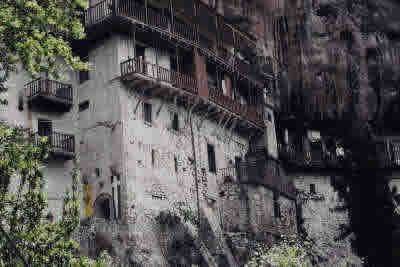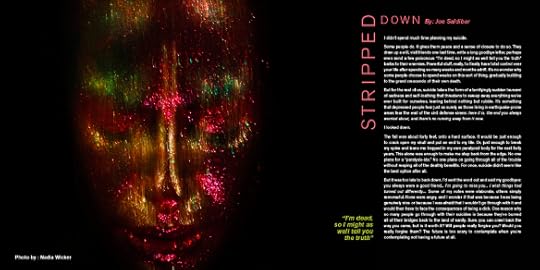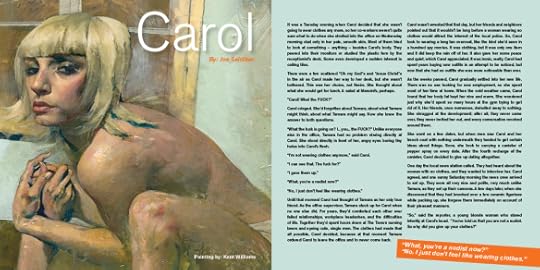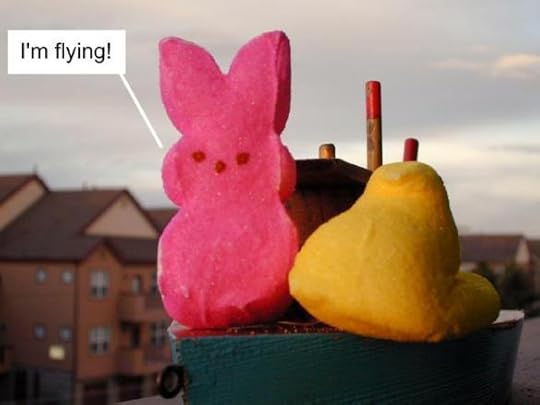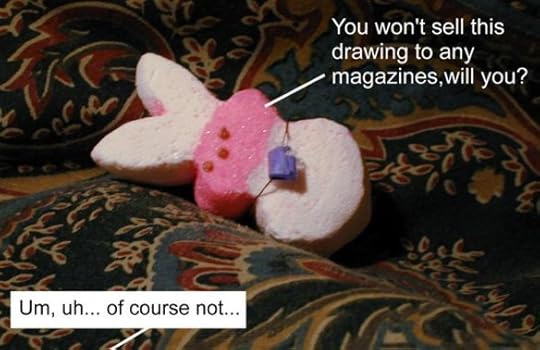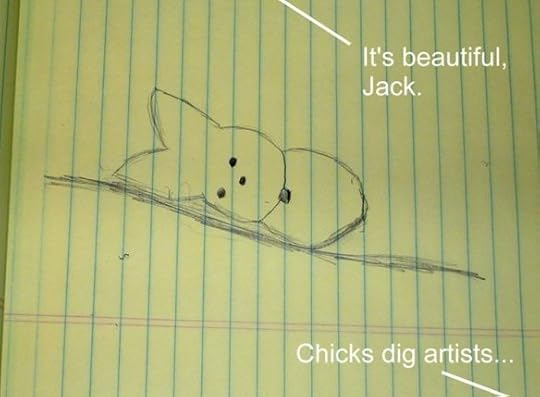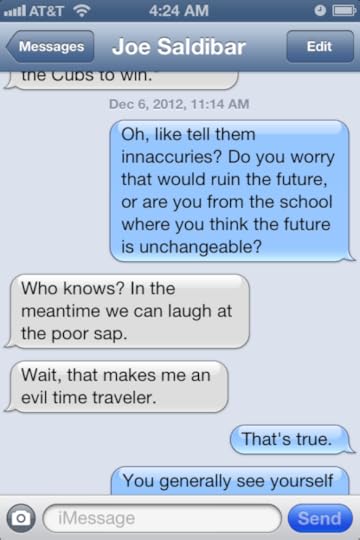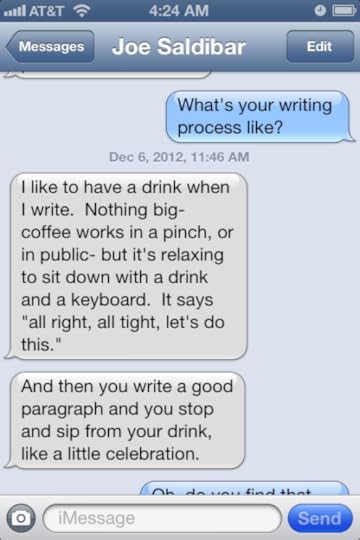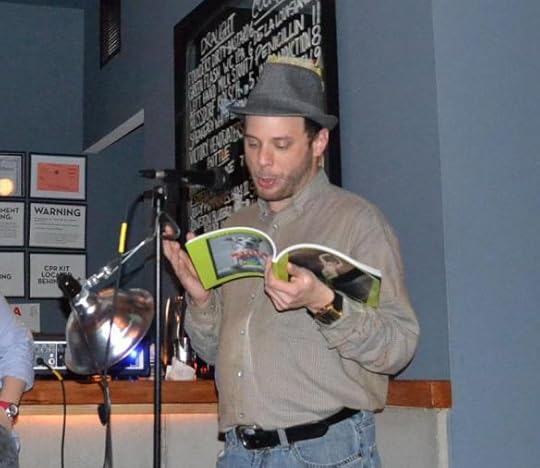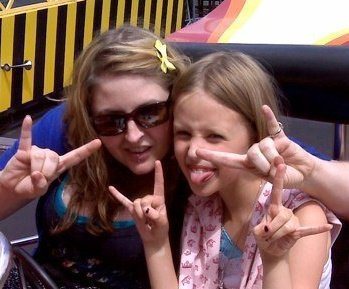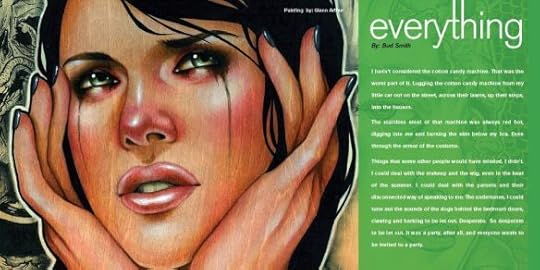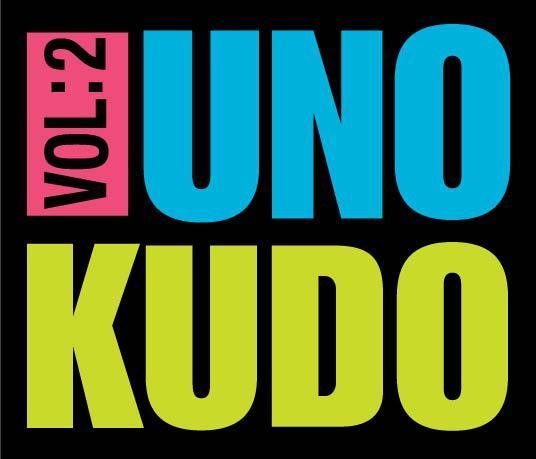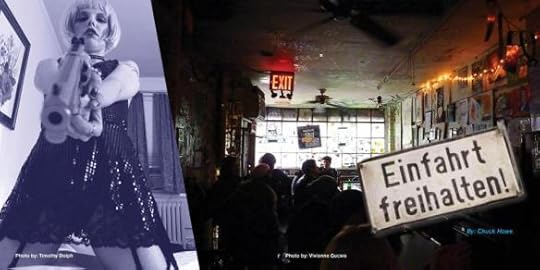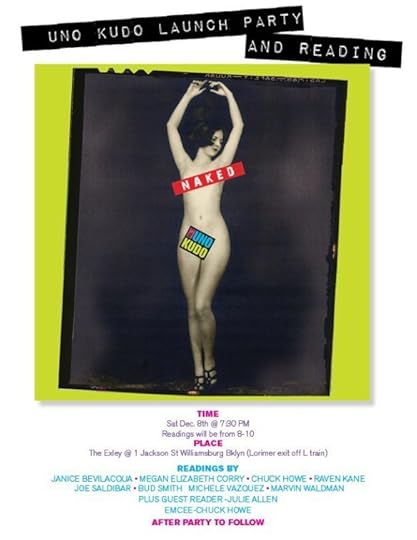Bud Smith's Blog: Bud Smith , page 34
January 5, 2013
The Next Big Thing: Tollbooth
Here it is again. The Next Big Thing blog post. These have been floating around and I’ve done one already for my project F-250 (which is nearing completion also). I’m the kind of person who likes to have a few projects kicking around. To me, if you’re gonna be creative, you shouldn’t stop moving.
Recently, Matt Guerruckey, the curator/editor of one of my favorite sites, Drunk Monkeys tagged me in one of these loops. Here’s a link to his post about his project “Poor Fractured Atlas”
In turn, here is what I’m working on. What follows is a Q & A about a novel being released in the spring of 2013.
What is the working title?
The novel is called Tollbooth. The main character is a toll collector on the garden state parkway in New Jersey. So, the title is a reflection of his job, yes, but his whole life … it’s just stuffed into this little box.
Where did the idea come from for this book?
I used to live in New Jersey. I’d drive up and down the parkway daily. In the days before EZ pass, I’d see the same miserable toll collector every day, in that same little metal tollbooth, gagging from fumes, handing out change for a dollar, just annoyed … and I started to wonder about his life. I imagined it was the type of job that would drive a person insane, or at least towards a mental snap. So I decided to write about that.What genre does your book fall under?
It’s literary fiction.There’s elements of humor, satire, dark humor, magical realism and twisted sex. Literary fiction for sure. Very character based. Told in the first person.
Which actors would you choose to play the characters in a movie rendition
The main character is the faceless everyman. It doesn’t matter. Somebody skinnyHis wife is a beautiful blonde who is also pretty good at basketball. Gena (his nineteen year old obsession) should be well versed in how to use a copy machine and also how to lean against the copy machine in a very slutty and provocative way … so, I dunno.In all honesty, this book is exactly like one of those weird “B” art films you see on cable late at night and you wonder “What the fuck is going on?”
There’s ghosts. A teenage kid who’s trying to start his own cult. A gang of small children called The Skullfuckers …
One sentence description of my book
As his wife’s pregnancy looms, a tollbooth operator’s obsession with the girl working at the copy center grows, setting off a chain of strange events.
Will this be self published or agented?
It’s set to be released by Piscataway House Publishing. I am very happy that they were so receptive to the manuscript, the idea behind it.
How long did this take you to write?
The first draft was written in a month and a half. It was given a re-draft over the course of a few weeks. Now, I’m working with an editor from Piscataway to fine tune it again and ready it for print. The rewrites on that should take anywhere from a month to two months. Self publishing worked fine, but I’m very happy to be working with professional editors, now. I think the readers will be happier too. Typos won’t get you laid, son.Release date for this book is set now around Easter. Look for it in your bunny basket.
What other books would you compare your work in progress to?
This book resembles Lolita by Nabocav, the first person mental snap of that narrator, the humor that’s still in there somehow despite the horrible subject matter. It also brings to mind Albert Camus … Just not so bleak. There’s also definitely some screwball absurdity that can totally be traced back to my enjoyment of absurd authors like Kafka. I think most of my writing has a cartoon element to it. This book is no exception. It’s about real life, but things are just slightly more Acme, more Roadrunner and Coyote than our real lives are.
Who or what inspired you to write this book?
This was inspired as a reaction to me seeing people around me in real life who are searching for happiness and maybe can’t find it, but they keep looking. It’s about refusing to grow old. It’s punk rock. It was written for a friend who likes to read. he liked it, so it was a success. Anybody past that, bonus.
What else about this book may pique your readers interests?
This book is a weird adventure. It gets more bizarre as it progresses. That’s life, right?

December 31, 2012
Hey there,
Happy New Years to everybody. I haven’t been p...
Hey there,
Happy New Years to everybody. I haven’t been posting very many short stories or poems because I have been working with an editorial team on a new novel that’s coming out in the spring, called “Tollbooth”
Hope you’re having a good New Years Eve and that you have a blast tonight.
Rock on
Bud

December 21, 2012
In Case They Come Back
We drove into the mountains in a diesel that we found abandoned by the sea. It kept threatening to catch fire, I kept nursing the pedal. There was a stone monastery up in the clouds that made it’s own wine and honey. We wanted some. We parked the diesel at the base, walked up the long cobblestone road, darted with wild flowers: orange neon and hot yellow, species unknown. Eagles flew around us soundlessly as the atmosphere thinned and our ears popped.
At the top, there was a monk in frayed brown robes, who was drinking out of a hole in the side of the cliff. He was collecting the spring water in his pink hands, cupping it, then sipping languidly—as if it gave eternal life and he’d been there since the stegosaurus. Maybe he had.
The monk was real happy to see us and didn’t seem like he got to see very many Americans. But, he thought that all we really wanted to hear about was the Nazis, because he’d seen a lot of old black and white war films and they were all about John Wayne and Henry Ford killing Nazis. The monk figured that’s all Americans wanted to talk about. “You all love machine guns,” he said.
I motioned to the massive wooden door with the golden chains dangling, “We’d like to go inside and see.” I had visions of intricate wood carvings. Inner sanctums. Tapestries. Painting from right before the world got lame.
He pointed at Bonnie said, “No women are allowed inside.”
Feeling bad, the monk brought out some jugs of wine in a large copper vase and we sat together, looking onto the small village from the cliff. Sheep and orange groves. Green rolling hills, the diamond sea in the distance. A valley with a field in which a black dog ran randomly through a maze of bee hives.
He started to give us the history of the village below and of the monastery itself. The monk said that Germans had come to the village in tanks and jeeps, gathered together all of the men. They took the men—walking in single file up the steep cobblestone road. Then, the Germans called the monks out. Everyone stood there in the mist, while the Germans threw them off the mountain one by one. Until there wasn’t anybody left. Then they burnt down the monastery. Then—the Germans went back down to the village and did what you could expect them to do with the remaining women.
I drank the rest of the wine. “They burnt this down?” I asked.
“It looks like it’s been here forever,” Bonnie said.
He nodded, pointed to a large carved wooden plaque, said: “those are all the people, their names.” Then, slowly, he pointed to the monastery, said, “If the worst happens again, we’re ready.”
“How so?” Bonnie asked.
“Now we’ve got cannons in all the upper windows. In case the Germans ever come back”

December 19, 2012
Uno Kudo Interview: Joe Saldibar
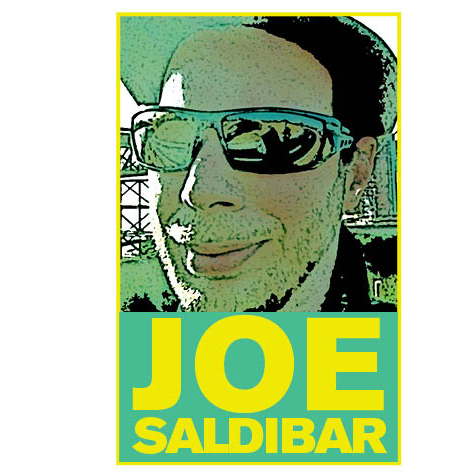
Joe Saldibar is the author of two short stories in Uno Kudo Volume 2, “Carol” and “Stripped Down”. They are stand out narratives from Uno Kudo, that blew me away, having details that glow and impress. Joe puts a lot of care into his writing. There’s also a level of intelligent humor in his stuff that is met in equal strides by his giant heart. He’s also the funniest guy that I’ve ever talked to online. One of those people that can turn a message board or comment thread section into a playground verging on work of art itself.
BIO:
Joe Saldibar was destined to lead a life full of drudgery and boredom. Then he discovered the power of the written word and the magic of storytelling. As a result, he grew up to live a life of drudgery and boredom that was relieved on occasion by writing short stories and poetry. Originally a native of the Northeast, he now resides in Denver (CO), where the winters are colder, the scenery more inspiring, and the pizzas far less interesting. In his spare time he rebuilds old bicycles and takes pictures of marshmallow peeps.
Bud: You have two excellent stories in Uno Kudo volume 2. Tell me a little about each one.
Joe: “Carol” started out at a coffee shop here in Denver. I was listening to a woman as she told her friend about the things she was doing to “get back on track” with her life. It made me think about how people are often very unhappy with themselves, even when they’re at least doing well enough to have friends to hang out with and coffee shops to hang out in. “Carol” is really about how desperate some folks are to change who they are… and how they often fail because they focus on changing the most the superficial aspects of their lives instead of looking deep within themselves.
In some ways “Stripped Down” shares that theme of being willing to look beyond the superficial and to really strip down to that raw emotional nudity, where nothing can be hidden or tucked out of sight. I wrote the majority of “Stripped Down” in one sitting- just there on the edge of my bed in the middle of the night, typing away until the whole story came out. Perhaps it’s a cliche to say that I got it off my chest, but it really felt that way.
What’s the weirdest thing you ever saw?
Weird things are everywhere. If there’s one thing I will never tire of, it’s watching people bring weird in their own wonderful way.
For example, that recent video from the East Coast where the guy was out jogging in the middle of Hurricane Sandy in shorts, sneakers, and a horse head mask. As Bill O ‘Reilly would say, “you can’t explain that!”
Last summer I met a guy who was on a mission to chug a beer on top of every Colorado mountain summit over 14,000 feet. There’s over 50 of them. So he gets to the top if the peak we’re climbing, opens the bottle, and half of it blows out because of the lower air pressure. Then he chugged the remaining foamy mess and cracked a huge toothy smile. Weird? Driven? Perhaps both ?
You watch telenovelas, I’m ignorant. Tell me about that?
I started watching them a year ago while I was sick in bed. It’s a universal thing, really, watching TV when you’re sick. I thought that since I was watching TV, I should make it useful, so I started watching “La Casa de al Lado” to learn Spanish. The thing is, the only words you end up learning are the bad ones, like “Asesina” (murderer)
Some telenovelas are pure trash, others are pure gold. Everyone is impossibly good-looking, even when their character is supposed to be ‘plain’ or ‘ugly .’ The story lines are ridiculous and the acting is way over the top.
But sometimes you find gold. Telemundo’s series on Pablo Escobar is a good example of a show that can be entertaining, gripping, and educational all at once.
You make marshmallow art with peeps sometimes, what inspired you to do that?
I used to make single-shot pictures of peeps doing random things, like sitting under a Christmas tree or hanging out at the beach. Someone sent me a link to a person who had created a 10-slide synopsis of “The Blair Witch Project” using marshmallow peeps as the protagonists. That got me thinking about doing something huge, so I started making a version of “Titanic.” That project stole a month out of my life. I worked on it constantly every spare second that I had, because I wanted to have it out by the middle of April (the Titanic sank on April 15th). I had a blast making it. Part of the fun was just coming up with ridiculously low-budget props and sets- the “Titanic” is just a wooden boat I got from Mystic Seaport when I was a kid, and the blue diamond from the movie is just a wadded-up ball of blue construction paper. When the stars of your movie are Leonardo DePeeprio and Kate Peeplet, you can afford to be a cheapskate. (To see the peeps movie, click here)
Do you believe in ghosts?
Totally! Now, are they actual supernatural spirits, or just a lame excuse my brain makes to justify things when it scares me into running up the basement steps after I turn off the light? That’s an open question. Sometimes I wonder if what we see is simply something so outside of our realm of reality that we’ve yet to put a real name to it, and our attempt to tie what we see into our beliefs about spirits will someday seem just as silly as when ancient civilizations ascribed lightning to gods tossing thunderbolts or epilepsy to demonic possession.
Ever seen one?
The closest I’ve seen to seeing a ghost in action was in England. We were staying at this old manor house- it started off as a 13th-century monastery and was rebuilt into a house in the 16th century. My friend Laurel swore that her room was haunted by something. So one day we were outside the building right underneath her window and we watched it open and close all by itself with no one inside. Windows can sometimes go up by themselves or close by themselves, sure- but both? At the same time?
Ever seen an alien?
No, but I had a blast driving through the back-end of Nevada in the middle of a pitch-black night looking for Area 51. It’s not nearly as secret as they make it out to be. You go there now and there are signs that say “Extraterrestrial Highway” and “Aliens Ahead!” This is probably because there is nothing alien at all about Area 51. Everyone knows that the real aliens are all stored at Area 52.
What’s your writing process like?
I like having a drink in my hand or on my table when I write. Doesn’t really matter what is in the drink- it could be coffee (usually is, in fact), or a beer, or whiskey, or even water. I like doing this because it’s a way to give yourself a little tasty reward for writing a line or a paragraph that you’re really proud of- like a literary drinking game. “Yes! I’m gonna celebrate this little moment RIGHT NOW!”
“Stripped Down” flowed pretty straight from start to finish, but most of my projects appear in chunks. I envision a scene or a line of dialogue and right that down, then build the story between the various pieces. It’s like building a bridge- you start with the abutments on the riverbanks and in the middle of the river, and then you connect those with the bridge spans, and then you pave the whole thing and open it to traffic.
With “Carol” it was a challenge because I’d written maybe 90% of it before I lost the whole thing in a hard drive meltdown. So that writing process was more about trying to remember what I had written and how, and then recreating it.
Where are you from?
Straight from a working-class family in a working-class neighborhood in a working-class town in a state that’s mostly famous for the rich people who occupy maybe a quarter of the place, if that. Connecticut is surprisingly blue-collar for a state where the manufacturing industry started to leave nearly a century ago.
My great-grandfather, Hannibal Saldibar, came to the US in 1905 aboard the RMS Republic. He headed up to New Haven and moved to what is now West Haven in 1910. He spent the rest of his life there. My grandfather lived there his whole life, and my dad lived there for a huge chunk of his life. That’s pretty typical for folks in the area, though. Unless they get sick of the weather and move to Arizona/Florida, they stick around forever.
We were one of those families where we didn’t have enough to buy what we wanted, but enough to buy what we needed as long as we scrimped and saved. Going to Goodwill was always a trip because as kids were were absolutely, completely terrified of being spotted inside the store (or worse yet, entering or leaving the place). Kids who were spotted by other kids got branded as “Goodwillers.” It was really dumb, considering that just about all of us had either hand-me-down clothes from older siblings, or thrift-store bargains, or “blue light” K-Mart specials- talk about calling the kettle poorly-clothed! But there’s that whole superficial thing at play again. We were more worried about what we wore- even though we couldn’t afford to be super-choosy- than about who we were.
Where would you live if you could? Why?
I love the ocean. I miss having an ocean nearby. The beach is a great place to go for a walk and to forget all of your problems for a while, or to have a nice place to work out those problems in peace. Out here we have the mountains, but you spend so much time climbing up and down that there’s not nearly enough time to have thoughts other than those related to route-finding and timetable-keeping.
I love cities. I love the flow and the noise and the mass of people. Small towns are nice and comfy, but the truth is that there’s not a lot to do on the weekends and that tends to create some weird small town atmospheres. Sometimes you get a nice place full of nice people. Other times you get a bunch of gossipy drama queens. Or you get a bunch of boring dunderheads who think that half-price Jello shots at the local dive is the highlight of the month. At least with cities you get ALL of these people. Then you can pick and choose which group is best for you.
What’s your strongest memory from childhood?
My folks got divorced when I was 15-16, and it was uuuuuuuugly. Like most divorces, it was long and bitter and full of back-and-forths.
On the flip side, we had some great Christmas years before then. My folks like the holiday and so did we kids, so we always did a ton of things. Going to the mall for shopping, making out lists, taking the train down to New York City just to walk down 5th Avenue and check out the scene, playing Christmas songs on our giant old stereo… fun stuff.
In fact, it’s really at the final Christmas or two, after the divorce and before college, that the whole divorce thing really hit home. All of those things just… stopped happening. Or, we’d do them but only out of a sense of duty. Or we’d do them but it would go terribly wrong. My mom was not the best planner in the world. The year after the divorce I helped her to get a Christmas tree from the local tree farm- it was only after we’d gone all the way into the fields and found our tree that she revealed that she didn’t have a saw to cut the tree down. She had a serrated steak knife instead, inside her purse. So we spent an hour hacking down this tree with this sad little knife.
Right now, there are no limitations, anything is possible for 24 hours, what do you do?
Ideally? I’d sit down and write. Write and write and write. If indeed ANYTHING is possible, I’d teleport myself to Fiji with a notebook and a beach towel first. Or visit the moon, so that I could pimp my book as being the first book written on the moon. I’d call it “Fifty Shades of Moonlight.”
December 14, 2012
Panda and the Meth Lab
There was an explosion, but I didn’t notice.
My mom ran across my dark room in a wild panic, her bare feet stomping all over my Legos but she was too high to feel them. At first I thought she was Panda, our dog. The way she was jumping up and down on me in my race-car bed. The sound of her delirious breath. Then, I heard her hoarse voice, saying that we had to leave. “Pack a few toys,” she said, “Coloring book, pants, shirts, socks … We’re leaving in three minutes.”
I stuffed a bunch of random things into my Curious George backpack. This had happened a few times — escapes in the middle of the night. I was getting good at it. I remembered back when I was four, being woken sweetly by my father, when he was still alive, taken sweetly out of our house to a surprise in the driveway. There was a Winnebago, rented or borrowed, something, not ours. We climbed inside and drove all the way from New Jersey to Florida. To Disney World. As a family.
Epcot. Teacups. Animatronic Pirates of the Caribbean and Splash Mountain. Kid Heaven. On our way back, we found Panda. She was just a little puppy then, being given away in the parking lot of a Food Universe in Tennessee, not far from Graceland.
Now Panda was gone.
My mom said it was lightning that’d scared her away. She’d run from it, wasn’t coming back. I thought about her snapping the chain, biting through it. Beating feet as thunderbolts went off all around, her frightened eyes — darting.
I placed a dish of food for her on the edge of the pines, watched the squirrels eat it with my toy binoculars from the roof of our trailer.
Mom’s story about my father wasn’t straight either. Sometimes when she was really messed up, she’d tell me a different version of how he’d died. A car crash, drunk driver. Or: “it was in his sleep, now please … go to bed.” I wondered if it’d been Freddie Krueger, in the basement of some industrial boiler
The worst:
“Yer daddy died out on a lake, a clear lake, with the reflections of the Rocky mountains falling on the clear water. It was a metal boat, silver, had his name on it in red lettering. Michael. He was fishing for rainbow trout in a metal boat … there was a storm … it came outta nowhere …”
Three minutes.
“Let’s GO!!”
I left my room, standing at the end of the hallway.
I could see her, she was in the bathroom, looking in the mirror. She was bleeding from her head. Crimson on bleached blonde. She kept touching where the blood was, pulling her hand back each time as if it was electrified.
She spun to face me, wrapping a hand towel with four leaf clovers over her wound, tying it on with a teal scrunchy.
“Station wagon, now …” she said drill sergeant from Hell-style.
Outside it smelled like fire. There was heavy smoke coming at us on a fierce wind. My eyes burnt. My throat stung. We drove out of the trailer park, the back way, through a dirt trail behind the dumpsters.
Through the pine trees I saw the first of the flashing lights. Red and blue. White and red.
They were coming. We were leaving. Strangers passing in the night.
West, I think. Pennsylvania, if I had to guess. I was too young.
Young enough to be carried into the motel by my rail-thin mother, placed on the bed. I slept with my furry monkey backpack next to me, woke up in the daylight with it under my chin, drool down George’s back.
She was weeping in a chair by the TV.
I was used to her weeping. I wondered if the TV had the Disney channel. That meant a lot to me as a kid.
My mom said, “I need you to help.”
“How?” I said weakly.
She called me over, passed me a pair of blue handled pliers. She’d been watching me sleep. Waiting for me to wake up. It’d been an all night thing. She said, “I need you to pull something out of mommy’s skull.”
“No …”
“Remember when grandma was alive?”
“Uh huh.”
“Remember the game, uhhh … Operation?” I nodded, “I need you to play Operation right now,” I can’t do it myself, I’ve fucking tried.”
“Doctor,” I muttered through a trembling lip.
“If mommy goes to a doctor right now, mommy will be in jail for a long time.”
She removed the hand towel. Her hair was plastered to the wound. She peeled it back.
I saw the hunk of metal. Shrapnel. Silver. Aluminum. The skin of a trailer, I know that now. I closed the pliers around the metal, there was a crunch, she cried out, I yanked.
Blood.
I’d play in that motel room. I missed my good toys. Mostly, I colored with crappy sub par crayons. I can’t recall what. Robots? Superheroes? Loony Toons characters? My mom would bring me supplies from the drugstore down the block.
When I got tired of coloring, I could look out the window and see her walking in and out of the smoky bar attached to the motel. She’d start at the corner, by the busy highway — stay there for a good forty five minutes — then drift back into the bar for a while. The cycle continued. Sometimes, she’d come to the room and say hello, see how I was doing.
“I miss my friends,” I’d say, “Suzie, mostly.”
“Well, you’ll see her soon,” she said, “we won’t be here forever.”
“It feels like forever.”
“Course it does. Five minutes seems like an eternity for a little boy, you just wait. Soon it’ll fly by. You’ll blink and everything will be different.”
Later, she came back to the room with a man. He smelled like the bowling alley. She told me to turn up the television. He had on work boots covered in cement.
She went into the other room with him.
The door shut. Locked.
I watched daytime TV. Small claims court. Judge Wapner. There was trouble in all sectors of paradise. Dogs fled. The sign that said Free HBO lied. The Happy Meals always came with repeat toys. My toothbrush with the Incredible Hulk was back in the trailer, I missed it. My bike was outside, not chained. Was it still there? Flip channels manually. The remote control is gone forever, too. Add it to your list of sorrows, son. Commercials for bubble bath. Calgon Take me Away. People talking loud outside the door, an argument out by the soda machine. I peeked out through the sheer curtains, the air conditioning coughed in my face. A man with a mustache screaming at woman with a pink pleather pocketbook. I sat back down, started to rock. Eternity is measured in smoke detector battery cycles inside the interstate motels. The one above my head began to chirp.
The door opened.
The concrete boots walked past me from my mom’s room. He left, gone forever.
I heard a car start. Distant. She said, “baby, turn that TV down. I need to get some rest now.”
When we did come back to the trailer park, it felt like we’d been gone for a hundred years.
Right away I saw the damage. The gaping hole where Susie’s trailer had been. A blackened hole in the earth, now.
I was horrified to see that. Susie’d been my friend. I went to elementary school with her. She let me use her fruit-scented markers.
“What happened?” I asked my mom.
She looked at me, said, “Lightning struck the trailer.”
“Lightning?” I gulped, “Was anybody hurt?”
“Lightning struck the trailer,” she said.
Then, there was a storm. The thunder was going haywire. It sounded like the clouds were being taught a severe lesson. I laid in bed, clutching onto my sheet in pure terror.
It started to downpour outside.
That was all I needed. I climbed like a little madman out of my bedroom window, landing in the mud, sliding. I ran for cover into Panda’s vacant doghouse. Inside, the sounds were deadened, and I was comforted by the smell of my friend, whatever had happened to her.
I closed my eyes and slept there in the forgotten dog hair, while the rain came down and the lightning lit up the sky.

December 12, 2012
Uno Kudo Interview: Heather Dorn
Hey there,
The internet still amazes me. You read a great poem by a poet somewhere out there in the ether and it changes the way you think about not only poetry, but maybe a lot of other things too. This happened to me with Heather Dorn. I read some of her stuff online and was so floored, I clicked around until I’d found the right Heather Dorn and BLAM, it’s that easy. That was a long time ago: 2006.
To this day, Heather is still one of my favorite poets and writers in general and I am so psyched to hear about the launch of her new website that will feature her writing. It’s called “Facts About Neuroplasticity,” Add it to your ‘Must Follow’ list.
So, I wanna introduce you to my friend …
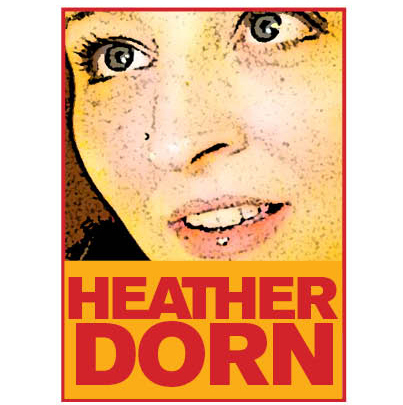
BIO!: Heather was born. She did some stuff and had some times and found herself here, in the present, with a broken washing machine and no expectation of escape. Sometimes she eats tacos to make up for this.
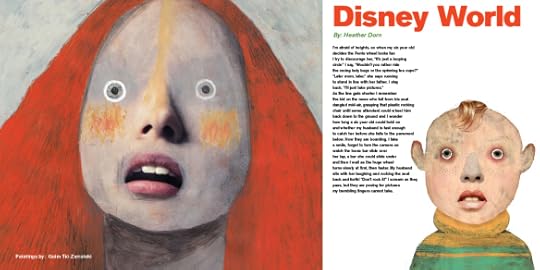
Disney World
—–by H. Dorn
I’m afraid of heights so when my six year old
decides the Ferris Wheel looks fun
I try to discourage her, “It’s just a looping
circle” I say, “Wouldn’t you rather ride
the racing lady bugs or the spinning tea cups?”
“Later mom, Later,” she says running
to stand in line with her father. I stay
back, “I’ll just take pictures.”
As the line gets shorter I remember
the kid on the news who fell from his seat
dangled mid-air, grasping that plastic rocking
chair until some attendant could wheel him
back down to the ground and I wonder
how long a six year old could hold on
and whether my husband is fast enough
to catch her before she falls to the pavement
below. Now they are boarding. I fake
a smile, forget to turn the camera on
watch the loose bar slide over
her lap, a bar she could slide under
and then I wait as the huge wheel
turns slowly at first, then faster. My husband
sits with her laughing and rocking the seat
back and forth! “Don’t rock it!” I scream as they
pass, but they are posing for pictures
my trembling fingers cannot take.
Bud: You have two poems in Uno Kudo volume 2, for me they are an absolute highlight. The poem “Disney World” encapsulates a lot of what life is in a narrow space. You went to Disney World with your family? Tell me about the trip.
H: We have three kids so we’ve been to a lot of fairs and parks, including Disney World. The “story” of the poem “Disney World” revisits an ongoing obsession I have with the safety of my children, something that always becomes an issue on vacations.
I don’t want them riding in cars late at night. I really wish they‘d stay out of the pool. Horses and donkeys and bikes are unpredictable. I don’t want them ascending mountains or standing near cliffs. I used to have this intrusive thought of Sarah, at two, running off the side of a mountain and falling through fog and clouds until I couldn’t see her fall anymore.
I really don’t like my kids riding rides either. Except the teacups.
I think I’m overprotective, but not in the way most parents these days are. I don’t do my kids’ projects for them, they have chores, and I’ve made them each negotiate for anything they’ve wanted (from a later bedtime to dinner choice) since they could speak. “Give me three reasons why,” I’ll say. “Reasons that mean something to mommy.” I just think a tornado is going to eat them in some spectacular Final-Destination-display, leaving me as empty as Job.
I think this comes down to the back and forth tug between playing it safe and YOLO. Don Marquis wrote a persona poem in the 1920’s called “The Lesson of the Moth” from the perspective of a cockroach who was talking to a moth about his reckless behavior. The cockroach couldn’t understand why the moth was so reckless, always landing on or near fire. The moth responds that fire’s beautiful.: “ it is better to be happy/ for a moment/ and be burned up with beauty/than to live a long time/ and be bored all the while.” I’m more a moth myself, but I want my children to live forever.
The poem “He Said Something About Hemingway” is another highlight for me. Talk a little bit about that poem. The narrative surrounding it. The circumstances of where it came from.
The Hemingway poem came from the experience of my pacemaker surgery. I was “awake” but unable to communicate. The whole incident was very sterile. Everything was metal and light. Even the blanket that covered my body felt metal.
As I was in surgery, I thought I heard my surgeon say something about Hemingway and I became concerned I wouldn’t be heard on the subject. I knew nothing about medicine, but finally, now, I could add something worth a damn to the conversation. I made sure to mark it in my mind for the Post Op discussion, though I never did actually ask him. I don’t really know *that much* about Hemingway.
My life was falling apart and I’d just spent days wondering if I’d be getting a transplant or if my heart would do well enough on medication to stabilize me. The rejection letters from PhD programs had been filing in and I didn’t know if I’d live to finish my thesis anyway. At the time of the surgery my Bipolar Disorder was also unmanaged. I was being treated for depression. Later when I went manic, the doctors realized their strategy had been all wrong.
When I first met my cardiologist, the day I was sent to the ER, he told me my “heart was shitty” and that he thought this was the “literary term” for the condition. As he gave my husband orders for admitting me, he gave me a persona. He liked Cormac McCarthy but I couldn’t get into No Country for Old Men so we talked about female writers who killed themselves or drank excessively. These were criteria he strangely picked on his own. I wondered if I gave something away when we met.
After the surgery, he would make comments like I should find a “bikini” that hid my scar. I’d laugh because he’d seen me naked but still thought me a person who’d wear a bikini. We’d discussed psycholinguistics and he thought I would expose my skin to criticism and sun?
Sometimes I thought it was a tease, but in the same voice he’d ask about The Bell Jar and if I thought Plath would have better luck today. I didn’t know, but given my success with depression I doubted it. I didn’t think myself much like Plath literarily, but I thought he might be disappointed if I didn’t eventually stick my head in an oven. So maybe this poem was partly for him.
Where are you from originally?
I was born in California. But we moved a lot. First within Cali and then to Missouri, Arkansas, many places in Texas and even Pennsylvania. Those are long stories though. They have to do with divorce and debt dodging and step-dad’s and limerence. But those details are not what make up my stories.
Then what are your stories about?
My stories are about always being the new girl, no friends and no place to call home. Insecurities. My stories center around the chaos I came to love and expect. Thrive on even.
I spent the longest time in Texas. I used to even consider Texas home. But since coming to NY State it’s not the same when I go back. But of course NY won’t have me either. Like being caught between the world of the poor and working class and the world of academics, nobody will claim me as their own.
So I’m resistant to answer hometown questions because I feel like people will say, “She’s not one of us! No, she’s nobody at all.”
What was your childhood like?
I like to joke that I grew up feral.
It’s somewhat true. My mom was a single mom most of the time and she always had long hours. Even when we had a new step-dad. I remember once we lived in a motel on Leopard Street (South Texas). Leopard Street was mostly drug dealers and hookers and a really awful (and poor) middle school.
Mom cleaned the whole motel so we could stay in one room for free. It was a room with two double beds, so my step-dad and mom stayed in one bed and my brother and I in another. It was somewhat swanky because we had a TV and could watch the Summer Olympics. But of course we only had a coffee pot for cooking.
It’s amazing the things you can cook in a coffee pot (Ramen is a-maz-ing), but luckily we got free school lunches and breakfasts too. And I ate every bite. I hated kids who swirled their food into a messy joke. I would’ve liked that applesauce before you poured milk and green beans into it, you fucking elitist.
Eventually we got a hot plate too. The hot plate brought much more variety to my diet.
But we lived (or “stayed”) lots of places. Apartments, campgrounds, parks, the van. Peanut butter was a staple. Once I remember a burned-out, abandoned, apartment building. Everything was burned. The couch and the walls and the bed. But it kept rain off and it was free as long as nobody knew.
But I preferred to be outside if I could be. The roaches and bugs were gross.
I remember things in crumbs – in flashes or bits, so that’s one reason it’s hard for me to talk directly about my childhood.
Tell me a funny story from when you were a little girl—adolescent.
Once my younger brother fell through our rent house ceiling. Well, really just his leg.
He was always doing something unfortunate. Drink all the cokes in the six-pack. Set our chair on fire. Break into a church.
Once he waited until my mother had just cleaned out the litter box and then he peed into it to make her think the cat had really had to piss that day. He couldn’t stop laughing, looking at the solid dark clump filling the entire box he hoped she’d find. He was about 13 then.
The day his foot fell through the ceiling he was older. He’d scared my cat up into the attic. Since he scared my cat up there, I asked that he get him down. I guess my brother didn’t know to step on the beams because BAM, his foot, then leg, came pummeling through the ceiling, right in front of the living room TV (which I remember being on top of a bigger, non-functioning TV).
Almost immediately my mother walked through the door with a bag of groceries. I remember it being a full paper bag with bread sticking out, like in comics, and she was very angry. I tried really hard to remain calm, but after only a few seconds, I started laughing uncontrollably.
My mother dropped the groceries and rushed to push my brother’s foot toward the ceiling, yelling at him to pull himself up. My brother cried he was trying. My mother pushed more. My brother’s leg wrangled around like a caught snake. I just laughed and gasped and my mother yelled at me to stop laughing. “It’s not funny!” she yelled over and over.
But it was. It was actually really funny.
What’s the craziest thing that you’ve ever seen/done/witnessed.
There are different kinds of crazy.
Once I sat with my two toddlers at the front desk of the daycare office for over 5 hours waiting for a spot to open up even though I’d been told many times there were no open slots. (I was very sick at the time.)
I’ve felt some craziness personally too.
One moment that stands out to me as formative was the time that I was sitting outside church waiting for Tuesday night “witnessing calls” to start and I saw a homeless man go into the church office. I was probably 14.
I was glad he’d found our church. I knew we had sandwiches in the fridge leftover from some activity we’d had. I imagined him taking 3 or 4 halves. Maybe he liked pimento cheese.
I went to church everything back then. I was doing the mission trips and the sandwich handouts under the bridge and the Jesus musicals and the door to doors and phone calls and testimonials and choreography and I was in the process of reading the Bible through and even though I had some questions, they were always on hold and I should really be less difficult, ok?
But instead of coming out happy with sandwiches, the homeless man came out of the church office pissed off and cussing about how he should be able to get help at a church and how he knew they had food in there.
I don’t know what happened in the office and why the man didn’t get some pimento cheese, but I knew we had sandwiches and it made me suspicious. I started to look at those questions I had more seriously and to trust the church’s answer of “faith” less after that. This made me more “difficult” over time as well. Suspicion is the start of a lot of good thinking.
That’s intense. Really. Come on, people, give the guy a damn sandwich! Hey, Where do you live now? Where have you lived?
I have physically lived a lot of places. I live in “Upstate” NY right now. What is “Upstate” about it being next to the PA border you will have to ask NYC peeps, but we are considered “upstate.”
I live in a very quiet neighborhood. Mostly single children households of 40-year-old parents and retired teachers. We are the loud ones. We have three kids and six pets (guineas count!) and two under forty adults who spend most of their time home.
I feel my neighbors must think we are into selling drugs.
I wish we were because we probably wouldn’t have problems paying our medical bills. But really, my husband works for a Texas company from home (software development) and I run community poetry workshops, which allow me a flexible schedule.
We are home a great deal.
But we also care for three children. That takes time. Being home time. Listening to who-hates-who time. We also have two dogs and three cats. That takes effort. Being home effort to train and work with them. Sit-drop-leave it-effort. But they are soooo cwuuuuute. Pwetty baybeees! The animals I mean.
I’ve lived in Cali, Arkansas, Missouri, Texas, and PA. Several places within some of those.
But I also lived with Jane Eyre at Lowood when I was about 11. I was in love with Helen (who wouldn’t be?) and Ms. Temple was so nurturing. I lived on Mango Street with Esperanza too. I lived alternate realities everyday. I still do. That’s not something one gives up
“Life is reflected in art. How is your life reflected directly into your art?”
You know, I feel like lots of poets are snobs. Just “art” people in general. They want things to be exclusive. They want to say what is good and that they get to decide. They want to make things more difficult than they have to be. Maybe to show off. Prove they are clever; smart. I don’t know, I’m not them. Eliot was brilliant, but reading “The Wasteland,” I can only think ‘what a fuckin’ douche.’ His book on cats was much better.
He wrote to show off. Languages. Allusions. Let’s all see how we can ejaculate our greatness into the void. But I just want people to understand and connect with me. I’m fundamentally lonely.
I write things for people like me (and therefore myself). Sometimes that means poems that the people I grew up with would understand. Sometimes that means writing to academics that are interested in the same narrow topics I am. Like Peter Elbow suggests, I am my own first audience.
In poetry that normally means working class to poor people. I think my poems can be deceptively shallow. They don’t use big words normally and they use the real life situations I grew up with. This to me is reality though. Depth without pretense. And so through simplicity of language people ignore the complexity of craft and it sometimes catches them off guard.
And subject/topic is more important than craft anyway. Craft is the clever way. It’s what I do to play. For fun. The truth of the situation – the subject – is what I hope people will take notice of.
I talk about issues I’ve experienced. Issues of poverty, abuse, mental illness, graduate school. I write about almost everything.
Once a friend said that the people who played their cards closest to their chest were the ones who seemingly told the most. I agree with this. He’s a wise man.
I think that you’re writing has an untouchable charm to it, because you do exactly that … just write for yourself. What are the similarities between your work life and your interest in art?
I’ve taught composition and creative writing to college students for the past many years, but my job now is running community poetry workshops for The Binghamton Poetry Project. These are grant-funded workshops that are free to the public and taught by Binghamton University creative writing teachers. I just finished a summer workshop for kids at the library and I’m about to go back to The Boys & Girls Club for this semester.
My workshops are mostly generative. We write together and we share with each other. My main goals are to get (and keep) them writing and to get them to see themselves as writers who have a unique voice and important things to say.
And they do. They have amazing things to share.
I am never more inspired than when I am leading a workshop.
I also enjoy lesson planning and research a great deal. Lesson planning is fun for me. I love to come up with a set of goals and then map out the readings, discussions, and writing that will help us reach these goals. I love to make the first day of class connect to the next on through to the last. Like a comedian who keeps coming back to a joke throughout her act, I want things to build and become more significant each time we return.
That is a different kind of art.
Heather, What’s your daily life like?
This question is too hard.
Maybe one day I stay up all day and night and day and I’ll work with the dogs on commands and jumps, and them I’m a therapist, listening to playground politics, and a tutor and academic advisor. I’m a taxi! I make collages! I make tacos! I make everything all better. The kids go to bed and I write and write and watch some TV and write again. Then I’ll fall asleep reading an article in School Library Journal which looks at some ideas for libraries who want to run workshops for children. “Get grants,” it advises.
Other days I can’t get out of bed because life hurts, so I stay in bed until I hear the 2:30 bus and I must be.
I’m working on it.
——————————————————————————————–
Also: for your interest, here is a review of Uno Kudo Volume 2 featured on one of my favorite lit. sites, Drunk Monkeys.
Thanks for being cool as ice.
Love,
Bud Smith
… and below, Heather Dorn will answer your questions!

December 11, 2012
Everything
Irene says: I hadn’t considered the cotton candy machine. That was the worst part. Lugging the cotton candy machine from my little car out on the street, across their lawns, up their steps, into the houses.
The stainless steel of that machine was always red hot, digging into me and burning the skin below my bra. Even through the armor of the costume.
Things that some other people would have minded, I didn’t. I could deal with the makeup and the wig, even in the heat of the summer. I could deal with the parents and their disconnected way of speaking to me. The undertones. I could tune out the sounds of the dogs behind the bedroom doors, clawing and barking to be let out. Desperate. So desperate to be let out. It was a party, after all, and everyone wants to be invited to a party.
My true fear was the children. Would I be able to face them again after what happened in Wooster? All those screaming, over eager children? Could I deal with them? It turned out that part was easy. All you had to do was plug in the cotton candy machine. Dump in the sugar and the water, let it whir to life. Make them all some cotton candy. They were yours then. You could get them to do whatever you wanted. All it took was a little cotton candy.
After just an hour, you’re free to go. Fifty dollars in your pocket. Then it’s the struggle with the machine down the steps, across the lawn, through the sprinklers. The dogs barking from the windows. Venetian blinds crooked, nearly ripped down by paws and gnashing teeth. Frantic. They are always so frantic to get at you.
They’re not the only ones.
The children don’t ever think to wave goodbye. They are busy with the birthday cake. It’s timed that way.
Take the wig off in the car. Wipe the makeup away. Remove the costume in the back seat. Reveal your true identity layer by layer, however flawed it is. Pink skin. Sweat. A young body like a piece of music that no one notices just yet. Maybe by the time you die they will appreciate it. Sing along, buddy. Sing along. Looking out the windows to see if the coasts clear, no leering lawn boys or ice cream truck men…quick, change into your little bikini, neon tetra neon tetra, steam up the windows. Meet your girlfriends at the beach.
Whatever lingering traces of the face paint remained around the edges of the eyelid and corners of the mouth, the ocean would wash off of you.
That is love.
My father caught me coming down the stairs from my room. Touched my arm. This was serious.
“Sweetie, I want to talk to you.”
“What, dad?”
“I just wanted to say that I’m a little worried about something…” Trying to be delicate with his wording.
“Go ahead…”
“Clowns usually wind up becoming alcoholics.”
“Oh.”
“OK, so just…watch your drinking.”
“Thanks.” It’s awkward. He stands there looking at me. Not sure who I am. I don’t know how to ease his worry about me. What happens is, each person becomes just one thing averaged out to each person who is even aware that you exist. I am worried about being boring. I am worried about being reduced to something simpler than I could really be.
“I’m going for bagels. Everything?”
“Everything.” I said.
———————————————————————————————
The service sent me out as Cinderella, which was better. I didn’t have to drag around heavy props. I could dust on a regular dosage of human flavored makeup. I got to wear a big wig, which is always something I like. My hair is thin. I hate it. I like having a big head. Some fake eyelashes, a long beautiful gold gown and some clear plastic slippers. We in business, son.
The crux was that I had to park the car a few blocks away and walk through the neighborhood in my gown. An illusion for the kids. Cinderella wouldn’t drive a brown Dodge Omni in real life, would she?
People walking their dogs would bust out laughing. Boys in loud import cars idle up next to me and tell me they wanted to show me their pumpkin. Even the mailman had some commentary. “I Like your costume.” “I like yours too.” I say. Eyes on fire till he looks down at his mailman shoes.
The party was tame. Little girls, all happy to see me. We drank fruit punch, pretended it was tea. They were asking tons of questions about Prince Charming. How many ponies did I own? Could I fly? Did I personally know Alice? Was I close friends with Snow White? Of course I know her, she’s my best friend. Were her dwarves as short in real life? Shorter. Snow White herself is a dwarf. The dwarves are just slightly bigger than microscopic.
After the party, the mother and father herd me into the guest room. They had a few points they wanted to discuss before they pay me and release me back into the wild.
“You were really good.” The mother said, “You’re a natural. How old are you?”
“19.”
“Perfect. This a summer job for college?”
“Yeah.”
“I want to give you our card. We have our own business.”
She handed me red card. I looked down at it. TEMPTATIONS.
“We’re always looking for girls with as much talent as you.” The father said, stroking his beard.
“You have such a nice figure. Your tits are great. They are such great tits. Have you ever considered stripping?” the mother asked.
“No.” I said.
“You should. I can tell you have great legs even with that gown.”
“Call us. You’ll love the money,” he said.
Then, I walked down the street, the sun reflecting off of my golden dress and my tiara and my long white gloves. I was lit up, impossibly bright and couldn’t stay out of sight, though I tried, believe me. My car was only a few blocks away, it felt like a thousand miles. There are no shadows that time of day. The sun at it’s brightest and most illuminating. Everything is obvious, everything exposed.
I could have stayed in Wooster. Things hadn’t worked out. My friend hooked me up with a job at the daycare center where she worked.
The kids were psycho. More kinetic energy than I can even explain. They ripped at my blouse, pulled my hair, flung things at me. I remember, helping a little boy put blocks away and while I was bent over one of them jumped on my back. Wild. Feral. A Little whirlwind I could not contain. I tried to get him off of me but he wouldn’t let go. Then, the teeth sunk in, pierced me so hard, broke through my skin. Drew blood.
I quit that job on the spot. Stop on a dime.
That night, I stood in the bathroom, looking at my wound in a mirror reflected in a mirror. My blouse crumbled on the tile floor. The circle of blood. My shoulder so swollen that I couldn’t wear my bra. I felt the puffy flesh, it throbbed, it pulsed, it was amplified a hundred times over and represented everything
When I went to the doctor, he wouldn’t give me tetanus shots or rabies shots for it. He thought it was funny I would ask. “Kids don’t have rabies…”
I disagreed.
As I drove south, my little car shaking on the highway at moderately high speeds. I felt worthless having to admit defeat and return to my parents. Their house. Their judgement.
The job they set up for me.
———————————————————————————————
I was in a cartoon cowboy suit. A massive helmet obscuring my entire head, a wide brimmed hat affixed to the top. I could see out of two small holes. It was hot in there and my hot breath echoed back at me. I slowly waved at the cars passing by on the road towards the beach. Behind me was a pharmacy that had a little window that sold ice cream cones.
I waved anyway at the traffic. I was anonymous. I could have been anyone. At one point, I saw Jesse and Callie drive by in the convertible. They were on their way to the beach. I very much wanted to be with them. I waved. They waved back. They had no idea that it was me. I could have been anyone.
A gang of little boys rolled up on BMXs.
“Look at this loser!” one kid yelled.
I just waved. They had a plan for me.
The next thing I know, I’m getting pushed around. They’re knocking into me with their bikes. Kicking me in the legs. Shoving me. I collapse onto the asphalt. I’m punched in the stomach, HARD. I feel the giant helmet jarring to the side. I yell at them to stop, they don’t. They just kept beating on me. They are frothing at the mouth in violent excitement. Kick after kick buried deep in my stomach. My neck. Stomping on my hands.
Then, the cowboy head was ripped off.
Cool air and sunlight rushing in. They gasp in surprise.
“IT’S A GIRL!”
The cowboy head is lobbed out into traffic and they flee away on their BMXs, Hurt, I lay there, lightly sobbing. Dizzy and shocked…when I finally get up and drag myself to the window, the ice cream girl doesn’t say anything. She just looks at me like, so? Then, she points at my cowboy head in the middle of the road.
A truck had run it over. Crushing it and splitting it apart all at the same time.
I sat alone at the kitchen table. I took the red business card out of my purse, looked at it. For a long time, I listened to the air conditioner, the sprinklers out in the yard, a bird in a tree. Wooooooo. Woooooooo. I looked down at my breasts that were almost resting on the table. I felt my legs under the table. I could be very good. I had the right body. I liked to entertain children. Men were like children. Weren’t they?
I folded the card in half. Tucked it back in my purse. I opened up the newspaper and looked through the Help Wanted Section.
The service was making me pay for the cowboy head. The joke was on them though, I still their had the cotton candy machine in the trunk of my car, they had no idea, but I didn’t make any more cotton candy. Fried Paradise took me in. I worked the register and I made french fries.
When I sold the machine in the fall, I had enough money for two books that I needed that semester.
The short “Everything” is featured in the new Uno Kudo, one of many stories from many different writers. “Everything” is also a short story from my book Or Something Like That.

December 10, 2012
Where You Were Dead

Here’s a poem about my childhood, the ordinary aspects of kidhood — growing up in New Jersey, running around all wild looking for the Jersey Devil, finding things, things finding me. All that stuff.
And thanks to everyone who made it to Brooklyn for the release party for Uno Kudo volume 2. Huge success that was, man. See whoever can make it to LA in January for the west coast release party. Gonna be a great time.
Thanks,
Bud
WHERE YOU WERE DEAD
i remember rocks hitting teeth
and punching a kid in the mouth
the way he bled on his white shirt
that said, “Dino the Last Dinosaur”
there were trips to the beach
we dug down so far the ocean showed
me and my bother in the pit we made
looking up at a sky so violently blue
as if drawn sloppy w/ blueberry scented markers
Banners pulled, wobbling bi-planes
advertisements for eternal life flown over the 1980s
neon smiling faces, dragged across New Jersey
boardwalk, crane game, zinc cream, seagull wars
Atlantic Arcade
you live forever, I’ll do the same
punch buggy yellow, punch buggy green
then we were walking in the tunnels under the asylum
into the flooded cranberry bog
armed with tree branch weapons
in case of werewolves, man
the toxic waste sunsets burnt over the powerlines
and I held your hand while you made up your mind
tripping on tripwire in the deertrails
burnt out shells of long ago parties
nothing is as depressing as a maze of pine
nothing feels as good as the first time
there used to be a field behind my house
where the dogs ran, but the dogs got sick
died slowly on the concrete floor
it was my father’s garage, stained with oil and wine
we buried the dogs down by the creek
the leaves covered everything so quick
now like my kid days, I’m not sure where the dogs are
somewhere in a nest of pine needles
long gone and without marker
vague and over-saturated wild hum technicolor
but there was christmas wrapping paper
so deep it covered the whole living room floor
my mom and dad didn’t have shit as kids
so for us they both worked two shifts,
aerosol spray can factor, fixing garbage trucks,
cutting fabric, day shift night shift
what’s the difference?
just wanted to tell you that I don’t remember anything specific
but I feel everything that happened in the cage of my ribs
like a dumb bird flying occasionally against my heart
bringing back fingerprint-thick Polaroid photos
and smudged cheap wax coloring book pages
the names of the deadend streets where I used to live
and the dreams that woke me up sweating
where you were dead

December 6, 2012
Crashes
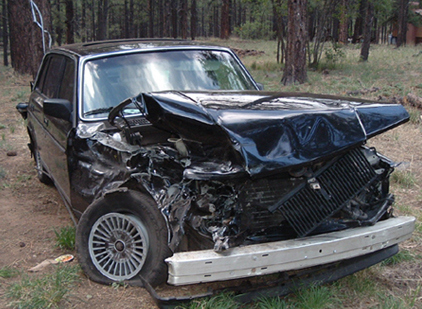
There were a lot of crashes, into people, places, things, whatever was around. That’s just how it was then. I was twenty three years-old, vividly out of my skull, squatting in an abandoned house on the lagoons, working off-the books for myself as a stone mason. My fingers were all nearly broken, my muscles sore, I wasn’t furthering myself in any way.
I drove a heavy duty Ford F-250 pickup truck. 1990. Blue. 92,000 hard miles. Loose ineffective brakes.
I’d bought it cheap, at the Shell gas station in Bayville, NJ after my 88 Pontiac Sunfire went up in flames on the Garden State parkway coming back from Atlantic City, 3:17 am: full moon, bad wiring, fire blooming from under the hood like a death orchid, melting everything.
There were small apocalyptic explosions as I cringed in the weeds and wild sage on the dirt shoulder, hopping the twisted guardrail, flinching with each doomed pop.
Drunk and high, I escaped into the dark pine trees along the parkway–running and ducking under sharp sniper-style juniper limbs. I couldn’t do anything. I watched the fire from some distance, sweaty and wild panicked, as the fire department arrived; and in a flurry of flashing red and white lights extinguished the blaze. Grey smoke, a hissing, sizzling, that competed against the insects of the night and almost won. The vehicle burnt beyond all recognition. I was lucky it hadn’t spread and started a forest fire.
Those were dry months, man.
I walked the five miles home to the Lagoon house in fear and desperation, looking over my shoulder the whole time.
I never heard a word about the Sunfire from any authorities, still haven’t to this day.
The F-250 was better anyway. It was a dangerous p.o.s. but I liked it. It was lifted/jacked, when you drove you were way up high over the road, looking down. It was four wheel drive, over-sized swamp tires, that couldn’t get stuck anywhere. Rusted out holes in the sheet metal, like Gremlins were eating i t in the night. No heat/no AC. Cassette deck. Doomsday.
The only change I made to the truck were cosmetic. The hick who owned it before me had plastered the rear bumper with rebel flag stickers. I took pride in scraping them off with razor-blades, put a row of Radiohead stickers that’d come with Kid A, red cartoon demons with massive sharp teeth. My buddy Seth gave me, worked at a record store, they were promo things.
Work. I used the truck for work, mostly. Usually, the bed of the truck was full of stone and dirt and too awkward to control and so I hit everything with it. Whenever I got distracted and stopped concentrating on the road it was—–bang. The back of somebody’s car crumbling in, dirt and shovels and concrete jumping up in the bed of my F-250.
So I drove nervously.
I’d hit a woman on route 9, the previous winter right in front of the 7-11. White mini van, personalized plates CATLUVR. Black ice, brakes applied, sliding, skidding—-ka-POW!
When I jumped out of my truck to see if Catluvr was OK, the lady rolled down her window, smashed me in the chest with a large Styrofoam cup of Dunkin Donuts coffee. Burning me. Steaming. Boiling. Staining my white thermal shirt brown. Post-attack, she just rolled up her window, took out her over-sized cellphone, called the cops.
I didn’t have a cellphone, not for two more years.
I put my hands in my dirty jean pockets and walked back to my truck, climbed inside, soaked, teeth chattering.
When the cops got there, one little officer with a funny mustache came to my truck and asked me, “Why you all wet?”
“Coffee,” I said pointing at the minivan, and the Styrofoam cup on the black ice.
The cop scratched his face, “checks out,” he said authoritatively.
An ambulance arrived, the lady climbed inside, clutching onto a calico cat. Without saying peep to the cops, she was driven away. We all thought that was pretty rude. The mustached cop felt especially slighted
“Whiplash,” her insurance company stated in a certified letter delivered to me at the Lagoon house.
I was being sued. Damage to the mini-van, to the driver, a vet bill for the calico cat.
Sued? Really? What did I have anyway; a guitar, an amp, some effect pedal stomp boxes, a drawer full of Fruit of the Loom black pocket t-shirts, a wheel barrow, some shovels, a couple boxes of random cassette tapes, Joy Division, Daft Punk, stacks of paperback books everywhere. Nothing. I didn’t even have a job.
None of that mattered.
Ancient history. It was spring, almost summer 2004. I was on my way to the ocean. I’d just finished a job building a set of concrete steps at the studio where my band was recording. A barter job: masonry work for some studio time.The bed of the F-250 had some dirt and sand, a few bags of left over cement, my wheelbarrow and shovels, but also: it had my 50 watt tube amp, my guitar, my music gear, chords, cables, power plugs. I was on my way play a show. One of my bands was playing at the Spider bar: always a great time.
I turned off route 37 and went down 70 towards Princeton Ave. I was listening to Led Zeppelin on the cassette deck, ‘Over the Hills and Far Away’. I had the windows down, the nectar of the world was thick and heavy, butterflies everywhere, slapping against the glass, I almost had to put the windshield wipers on to clear them.
Apocalypticly, the cassette deck began to eat the tape, I desperately tried to eject it. Robert Plant, Jimi Page and the rest of the gang were being mauled by the gears. The magnetic spools of tape shredding diabolically.
Forward I propelled, screwing with the tape, when I looked back at the road, it was too late to stop. A line of cars waited ahead at a red light that was usually blinking perpetual yellow. I stomped on the brakes. The F-250 skidded, fish-tailed, rubber melting on the asphalt.
Wham!
The rear end of a powder-blue Lincoln Continental caved in horribly. Rocks and sand rained down from the bed of my truck. Frame twisted. Tail pipe pushed up beneath the under carriage. Fluids leaking out.I felt sick.
The drawbridge was up!?? In all my life, living in that area, I’d never seen the drawbridge up on Princeton Ave. Well, there it was, and there I was — another accident.
A line of cars pulled behind, blocking me in, as I considered escape.
The door of the Continental opened, unevenly. An old man, a true geezer, stepped out, scratched his baked potato-shaped head. He was wearing sky blue polyester pants, Velcro shoes, a white striped polo that accentuated his man boobs and turkey neck. This man hunched over, studied the demolished back of his crushed Continental.
Remembering the coffee cup incident, I stayed in my truck.
The damage was severe. B-b-b-bad. Crinkled. Creased. Folded horribly. Muy mal. No bueno. Call the wrecker. Alert the body shop. Ready the grinders, welders, painter. I’m sorry, Sir, your car may never walk again.
I held my breath in utter dread as the old man surveyed the automotive massacre.
This was it for me. I was already broke. I was already getting sued by a whip-lashed lady with a paralyzed calico cat. Theyhad me.
People waiting for the drawbridge got out of their vehicles too. They wanted to get a look for themselves at the show.
They stretched and paced around and glanced over at us. We were high entertainment.
Then, the old man with the baked potato head, spun around, looked at me with soft eyes. I waved sickly, mouthed, “I’m sorry.”
He smiled, waved back, offhandedly gave me a thumbs up, remarked: “Forget about, it’s s’nothing
He got back into his Lincoln, closed the door. The bumper fell down, attached ever so slightly just on one side . Nothing was done.
Here was the worst part: we sat there for ten more minutes like that, the drawbridge hanging up in the air, unseen boats possibly passing underneath, no one knew.
I was sweating like a madman.
The other people, the spectators, were all out of their vehicles, gawking and pointing. I had to sit there like a pariah basking in my careless shame.
The shame was manifested so clearly, my ineptitude. I could see it right before my eyes. The rear bumper of the Lincoln hung on by a thread.
A guy walked up to my window, he was chewing gum and stunk like cologne.
“You really whacked that guy,” he said.
“He said, it s’nothing,” I informed the concerned citizen.
He furrowed is brow, “S’nothing? I don’t think so! You gotta call the cops.”
“Zero good ever came outta calling the cops,” I said, glaring at him until he backed away and spit his gum out into the grass. He got into his bright yellow Geo Tracker, gripping the steering wheel with white knuckles.
All of us had white knuckles as we sat another five eternal minutes. Then, the drawbridge descended down. The light turned green.
Tom Petty came on the radio, “Even the losers, get lucky sometime …“
We all began to move again.
Very carefully.

December 4, 2012
Uno Kudo Interview: Chuck Howe
Yo!
As I’ve mentioned, Uno Kudo: Volume 2 is out! It is an art meets lit magazine that is absolutely blindingly neon. Really, a stunning collection of stellar writing paired with some wild, out of this galaxy artwork. It was created to raise money for PEN International. You can learn more about the Uno Kudo project here, and watch a trailer over-viewing the artwork here.
I worked on Uno Kudo as an editor and got to know some really sick artists and writers that I’ve been partying like crazy with recently.
Below is an interview that I conducted with one of the writers, a guy that really killed his story in Uno Kudo …
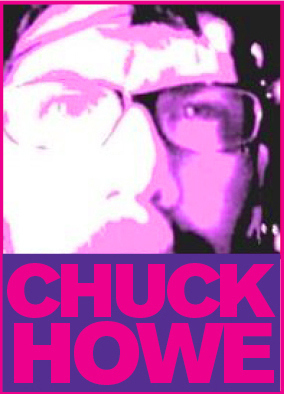
Chuck Howe is a Hippy Shaman living in Upstate New York where can often be found telling jokes to squirrels and dandelions. He has been known to use his dark hippy magic to attract women way out of his league. Currently he is working on a book of short stories, “If I Had Wings, These Windmills Would Be Dead” due in the Spring of 2013.
Chuck’s story Einfahrt Freihalten (keep platform clear!) is a first person ‘gonzo-style’ short that takes place in Germany, focusing on a love affair gone weird and the cultural tension that arises when you send an American Deadhead to rigid-law Deutschland. It opens up with a man in dropped trousers being held at gunpoint by modern day German police officers on a train platform, and things just get worse from there.
(an excerpt)… I stood on the platform, naked , as my train to Amsterdam pulled into the station. Two policemen/ soldiers stood on either side of me holding on to automatic weapons sifting through my bag and my paper work. I wondered what the inside of a German jail looked like. I was afraid I was going to find out …
I had a chance to sit down with Howe at my neighborhood bar, Le Cheile on 173rd street in New York City. Here’s what went down.
Bud: You first told me this story over a beer at a party — it the first time that we met. I’m glad you wound up writing it down. It cracks me up, has a lot of life in it, definitely carries a sense of odd adventure with it.
Chuck Howe: I like to do things, I don’t like to plan. That usually leads to disaster and disaster is always fun. It also seems like adventure follows me even when I just want to stay home and have a quiet night.
You seem to have done a lot of traveling here and abroad. Where have you been?
Some of my favorite trips have been absolute disaster. I write about one in Uno Kudo Volume 2 that found me getting strip searched on a train platform in Germany. That wasn’t even the craziest part of the trip. I smoked weed standing in the middle of the North Sea at low tide. The water was completely gone. I was staying on an island called Langoog, and it looked like I could walk all the way to the mainland. Once I realized how far from shore I was and that I had no idea when the water would come back, I ran full speed back to the island.
On a trip to Brazil I somehow found myself as the only straight male on an island when a cruise ship of Europeans arrived for the weekend. I had no clue it was gay pride weekend and neither did most of the tourists coming off the boat. I saw more penises that weekend then I have seen the rest of my life combined, but I was also the only Tan, dark haired man that had any interest in the gorgeous women coming off of the boat.
My parents always made sure we took fun trips growing up. Mostly we hit different parts of America, but we spent one Christmas in Bermuda. I always enjoyed them no matter where we went. As an adult I did a fair amount of International Travel. Europe and South America. I haven’t had a good long trip in awhile though. Mostly just weekend road trips. It’s been a kick going to places like Burlington and Ithaca and Atlantic City. Places I haven’t been in years, and see them through adult eyes.
You toured a lot when you were younger? Followed bands?
I am a huge fan of interesting music. Mostly jam bands, but I love world music, Jazz, even opera. My own music tends to draw influences from Brazillian Bossa Nova to Parisian Hot club jazz.
(here’s a link to Chuck’s music).
First. the grateful Dead and later Phish were huge favorites of mine. I am never adverse to driving 8 hours to go see a show. I have been to over 100 Phish shows and I am still adding to that number whenever I can. It’s a gypsylife, but you meet such amazing people of all types, it is the perfect circus for a writer to study. Phish shows aren’t just a concert. The parking lot before hand is almost as much fun as the show itself. Everyone is selling something, and trading is always encouraged. I’ve sold shirts on tour, trading them to get tickets for shows. We’ve done bagels and cream cheese after the show. I’ve done shit just for the fun of it too. Sitting around playing banjo at the Gathering of the Vibes, guys on guitar wander over and join you, you have a nice little jam before the show, it’s awesome.
Who are your biggest artistic influences and why?
David Byrne is a true artist in every sense of the word. He just sees the world in a different, better way than anyone else. I draw influences from all of the arts, even though writing and music are my focus. As a child I loved to read. I read everything ever put in front of me. I used to read Steven King and Anne Rice during my free periods at school. Later on I got into the Russian writers. Notes from Underground is a favorite. Lately I have been reading more written by friends, my peers. As far as my own writing, I think Hunter S. Thompson has as much influence as anyone else, but lyricists like Tom Marshall (Phish) and Robert Hunter (grateful Dead) have as much influence on my storytelling as anyone else.
Where are you from originally?
Mount Kisco New York. A small town tucked in between Bill Clinton’s Chappaqua and Martha Stewarts’ Bedford.
I like to complain about the area, but really I love it. I am an hour away from the heart of NYC and can hit a deer on my way home. It was a great place to grow up. I spent a lot of my childhood in the woods. The schools were really good and the students came from all sorts of backgrounds. I went to school with the children of actors and musicians and bankers, but there were also a lot of first and second generation Americans fighting to get create their own roots in the area. In the very early 80′s, after an earthquake in Italy, there were a lot of new Italian immigrants joining family members who came here two or three generations before and then came a large wave of South and Central Americans into the area. It’s been really interesting to see this small town change over the years.
What was your childhood like?
I had a great childhood. I know that’s not hip to say but it’s true. I had loving supportive parents. My Dad was my little league coach, My Mom was a Cub Scout Den Mother, and class mother. We didn’t have the wealth that some in the area have, but we were never starving or really left wanting of anything. We would buy crappy houses in nice neighborhoods, spend a few years fixing them up. Weekends with my mom up a 2 story ladder painting outside while my brother and I would help drywall the ceiling in the living room.
So you’re pretty comfortable with tools and construction? What’s the most dangerous thing that ever happened to you?
My father and I were actually putting up the cross beams on the roof of an addition we were building. I had just turned 16, and as the fourth driver in the house I got the worst spot, right next to the Garage/master bedroom we were building. It was the most ambitious project the family ever undertook. My father was up a ladder hammering in the cross beams to the main beam as I was holding the other end in place against the wall. I was holding on for dear life because if the beam fell, it would hit my car. Right as my father was about to start hammering, a wasp landed on my elbow. I usually keep my cool with animals and insects, but I knew the second my father started hammering, the vibrations would travel through the beam into my arm. I told him not to hammer, as calm as I could, but we were stuck. He was holding his end up about to hammer and couldn’t come down. The wasp showed no signs of wanting to leave. I told him to just do it quick. Sure enough, first smack of the hammer, the wasp stung. I had to wait for my dad to finish his end, come down the ladder and nail my end in before I could let go and truly bust out my theatrics. It may not have been life or death, but if I wrecked my car I might have ended up having a heart attack…
You did good in school there?
I would get away with murder with teachers and other kids parents, never with my own. I looked innocent enough, but was always in trouble or looking to get into trouble. I definitely lived for the moment and figured I could weasel my way out of the consequences, which I often did.
What’s the biggest thing you got away with?
I guess the statute of limitations has run out for most of it… Nothing too serious, but I used to be the one who had to talk to the cops when they came to bust a party, or talk to the Principal when we were caught smoking on the roof. Teachers always seemed to believe me. I told my 12th grade math teacher that I wouldn’t be in class on Fridays all winter long because I was a professional snowboarder. She never even asked to see a note from home, I guess I just looked innocent enough to get away with it.
Where do you live now? Where have you lived?
I’m in Mount Kisco now, just a few blocks from one of the houses I lived in as a kid. For the most part I have been in Northern Westchester. I lived in Western New York for a little while, and Eugene, Oregon for a little while too. I haven’t been out to Oregon in almost 20 years, so I would love to go back there again soon
Writers always seem to have some of the most interesting jobs besides writing. What kinds of jobs have you had?
People always think that my jobs in radio have been the most interesting, but I have also done a lot of carpentry and painting work, which I always loved because I could let my mind explore while I worked and then I get home and write. I’ve started writing more stories and songs while painting a wall or digging a ditch or crawling on my back insulating a crawl space.
The jobs that I have actually enjoyed the most have been in retail. Working as a barista was one of the most fun jobs I have ever had. (trying to run or own a coffee shop, not so much) The percussive elements of the espresso machine, stainless steel pitchers and spoons are a lot of fun.
A morning rush is like trying to play three straight soccer games with no half times or time outs. The first moment you get to relax, you realize your day is almost done and it isn’t even noon.
Another great job was in a Book and Music store in Mount Kisco. It was one of the only independent ones in the area and we had a very prestigious staff and
customers.
Like Who?
We had some great customers. My personal favorite was John Cohen of the New Lost City Ramblers. The top bluegrass band of the fifties. He schooled me hardcore the first time he came in, I can’t remember which story I tried to tell him, I think it was something about Roscoe Holcomb. He corrected me. I would find out later that he was the one who first discovered and recorded Roscoe on a back road in Kentucky. He was in the store once when Woody Guthrie’s daughter Nora was in. I introduced the two. The next time he came in he had a poster sized photograph of Jack Kerouac and Woody Guthrie sitting against a brick wall listening to Bob Dylan play. ”I took this picture years ago, please give this to Nora,” he said handing me one of the greatest American photographs ever taken.
Of course I had some funny exchanges. I worked at a Sam Goodie for a little while. One night I was in the back office when one of the high school kids rushed in and said “She’s here, Aisle 3!” I assumed the kid meant the girl we caught shoplifting. I ran out and went straight to aisle three and said in my loud scary voice. “Can I help you?” She turns around and it’s Mariah Carey, looking at the Mariah Carey section of cds.
She got all pissed that we didn’t have enough of her CDs. We had one of her last few albums and four or five of her album that came out earlier in the year. ”Yeah, we try to only carry what will sell.”
Everybody always thinks they know a lot about music until your first day working in a record store. You are humbled by a customer very early on and figure out that you can learn as much from the customers as they can learn from you.
What is the similarities between your work life and your interest in art?
My art, whether it’s stories or music, are all influenced heavily by my life, as every ones is I am sure. I did make a conscious discussion a few years ago to get away from politics. I was studying politics non stop for work. All of my writing and music was political. The things I wanted to say on air but couldn’t invaded my creativity. It was all very angry stuff, and though there were many who liked it, I don’t like to be angry. I got out of politics completely and have been very happy ever since. And though I still have some political messages in my work every now and then, I try not to let it be the focus of my work.
Thanks for talking to me about your life.
Anytime.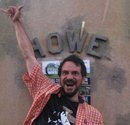
Also: There will be a release party and reading that is taking place Exley in Williamsburg, Brooklyn this Saturday December 8th, starting at 7pm … with a big beer bash party to follow that will put everybody into a coma. SO COME ON OUT!

Bud Smith
- Bud Smith's profile
- 471 followers


